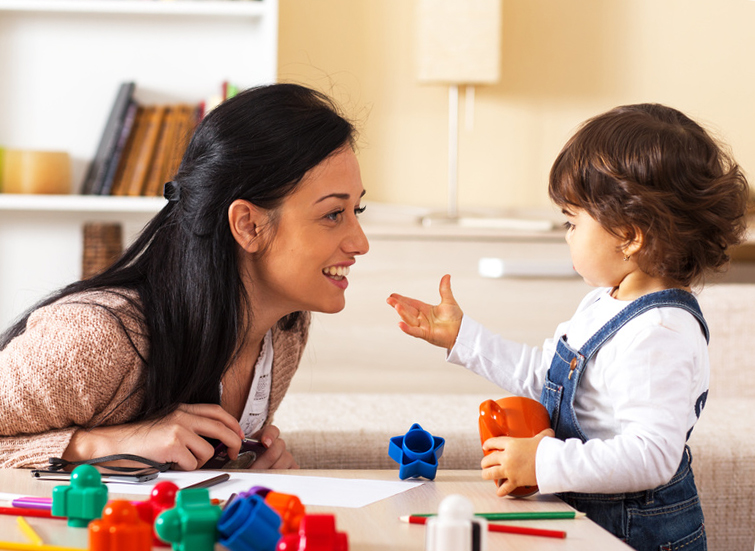Verbs Pave the Way for Language Development

It’s really exciting when children begin talking. If you have your own child or have had the opportunity to watch a young child develop, you may have noticed that a child’s first words are usually the names of people or things (nouns), such as Mama, Dada, ball, car, or bear. But by the age of two, young children should also be saying verbs. Verbs are words for actions like go, come, wash, eat, or words for states like want, like, love, see.
Examples of verbs that young children tend to learn first [1]:
bite, blow, break, bring, bump, clean, close, cry, dance, draw, drink, drive, eat, fall, feed, finish, get, give, go, help, hit, hug, hurry, jump, kick, kiss, look, love, open, play, pull, push, put, read, ride, run, say, see, show, sing, sleep, smile, splash, stop, swim, swing, take, throw, tickle, touch, walk, wash, watch, wipe, write
Why Are Verbs Important?
A recent study showed that 2-year-old children who use more verbs have more advanced grammatical skills six months later.
Verbs are very important for language development because they allow children to start building early sentences. Every sentence needs a verb. And the choice of verb determines many of the grammatical forms in a sentence. In fact, a recent study showed that 2-year-old children who use more verbs have more advanced grammatical skills six months later [2].
When Should Children Start Using Verbs?
There is a lot of variability when it comes to how many verbs children use when they are toddlers. But children should say at least a few verbs by 24 months. Many children can say at least 40 verbs by 24 months [3]. A child with only three or four verbs at 24 months would be at the low end of the average range [2]. This would not be cause for concern as long as the child continues to learn several new verbs every month for the next six months.
But children with no verbs at 24 months who don’t start to speed up in the rate at which they learn new verbs between 24 and 30 months may be at risk for problems with language development [2]. These children will not be able to produce short sentences yet, as they can’t build sentences without verbs. If they have any other risk factors for a long-term language difficulty, it may be wise to seek advice from a speech language pathologist who can determine whether they need help building their vocabulary. See our article “How to Tell if Your Child is a Late Talker – And What to Do About It” for more information and a list of risk factors.
How to Help Your Child Learn New Verbs
- Keep a list of the verbs your child understands and says. Children have to understand a word before they can begin using it. Knowing what verbs your child understands will help you know which verbs you might repeat regularly to help him learn to say them. And keeping track of the verbs your child already says will help you know if he or she is learning new verbs each month.
- Think about things your child likes to do. By identifying toys, foods, and activities your child enjoys, you will be able to think of action words (verbs) associated with these things. For example, if your child enjoys bath time, you could repeat verbs like “pour”, “wash”, or “splash” when he has a bath. If your child likes to play with cars, you could use verbs like “push”, “crash”, or “go” when you play cars together.
- Show your child what the verb means. Verbs are action words, so whenever possible, try to do the action while you say the verb in a short sentence. For example, if you are helping your child learn the verb “push”, make sure you push the toy car while you say “I’m pushing the car”. This helps your child remember the new word and what it means.
- Repeat, repeat, and repeat some more! Children need to hear new words many times before they start to use them themselves. When interacting with your child, try to use a new verb several times during the activity. Then use it again the next time you do that same activity. And then use it again when you do a different activity with your child. For example, if you’ve been emphasizing the verb “pour” every night at bath time, remember to use it at meal times when you pour a glass of milk. In this way, your child will have many opportunities to hear the new verb in a variety of situations.
In Summary
Children need to learn all kinds of words in order to talk. Verbs are especially important because they help children communicate about events in the world by combining words into sentences. Using some of the tips above, you can help your child learn verbs and pave the way for his language to develop.
Similar articles by tag:
